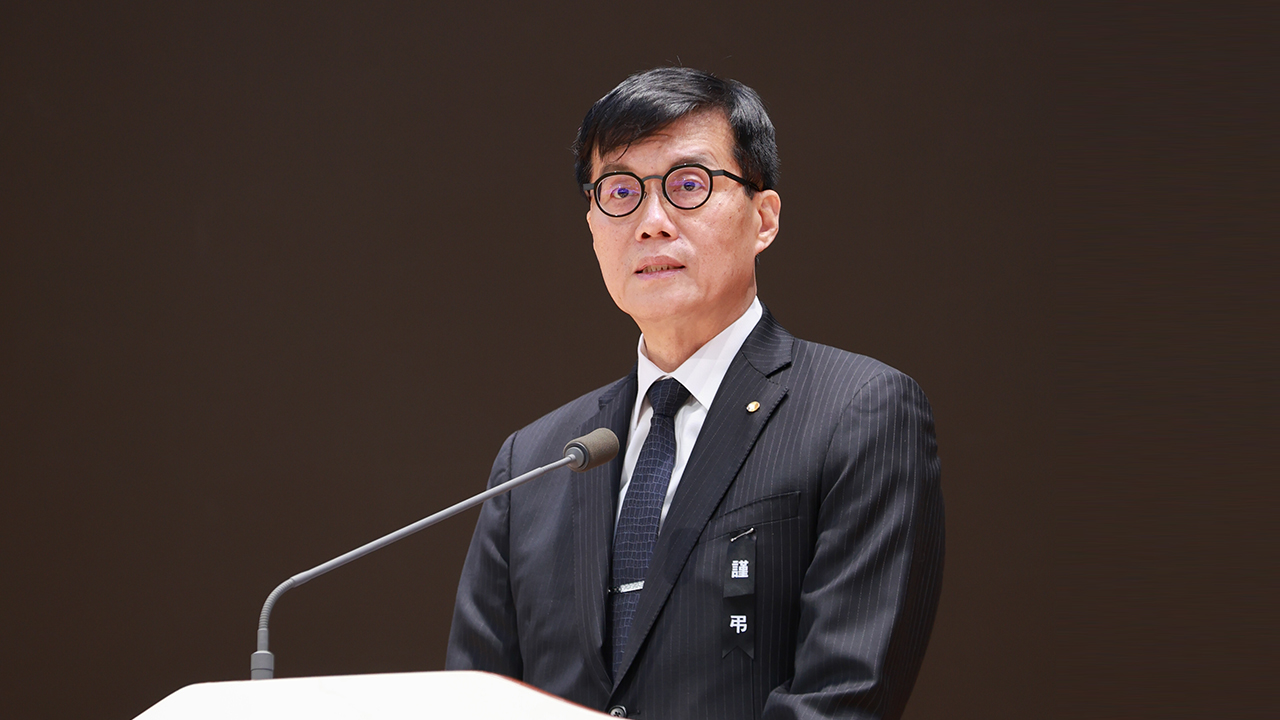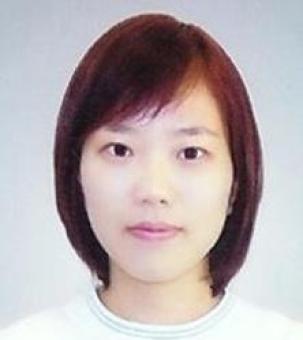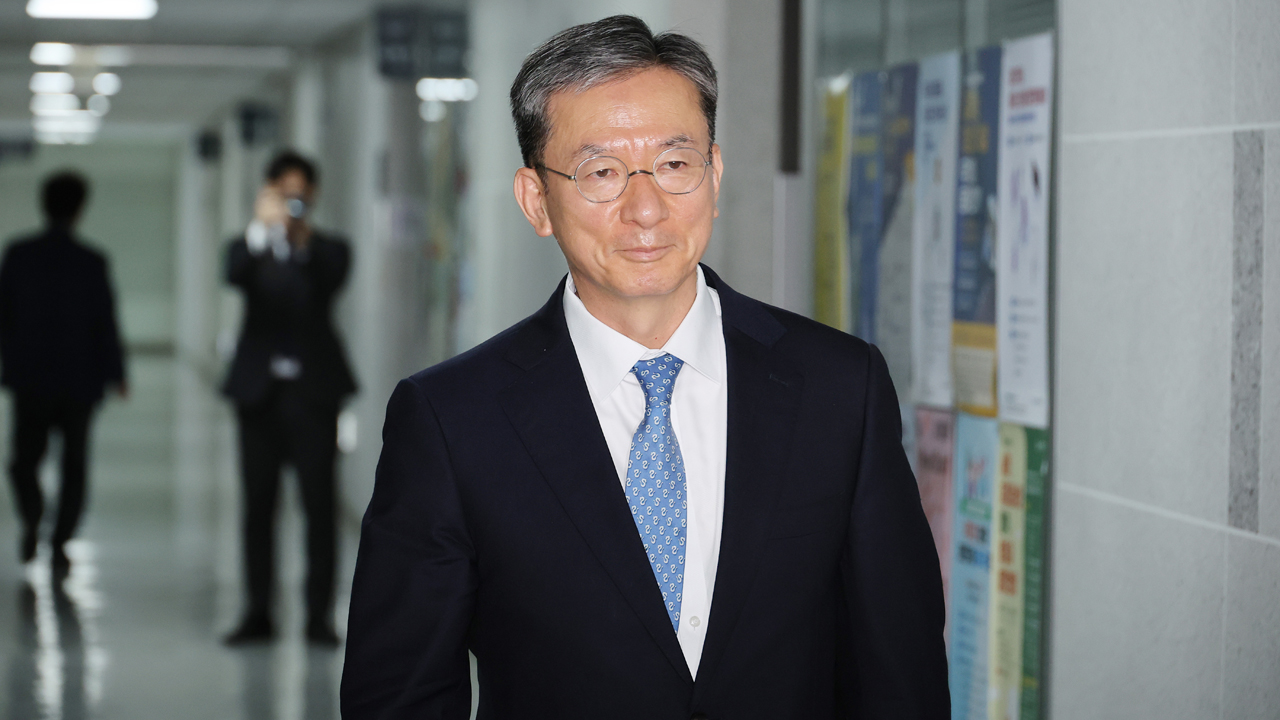BOK weighs interest rate cuts amid economic uncertainty
입력 2025.01.03 (00:29)
읽어주기 기능은 크롬기반의
브라우저에서만 사용하실 수 있습니다.
[Anchor]
While early execution of the budget is good, there are significant opinions questioning whether that will be enough.
At the forefront is Lee Chang-yong, the Governor of the Bank of Korea.
He actively called for supplementary budgets at the end of last year, and today he made remarks that could be interpreted politically.
[Lee Chang-yong: "Our various executives were told to just read and absolutely not to ad-lib, but I feel I cannot refrain from saying a word. I understand there are various criticisms regarding Acting President Choi Sang-mok. However, when making those criticisms, it would be good to also provide an answer about what would happen to our economy if Choi had not acted in that way."]
In the context of needing high-intensity measures to avoid an economic recession, there is growing interpretation that the Bank of Korea may lower the base rate three times in a row for the first time since the financial crisis at the monetary policy committee meeting scheduled in two weeks.
Reporter Kim Jin-hwa continues with the report.
[Report]
To boost consumption in the first half of the year, income tax deductions will be expanded.
If spending exceeds last year’s first-half total by more than 5%, 20% of the additional amount will be deductible.
For example, if you spent 10 million won in the first half of last year and 12 million won in the first half of this year, you would receive an income deduction of 30 million won, which is 20% of the 1.5 million won that exceeds the 5% threshold.
[Jo Hyun-soo/Seongdong-gu, Seoul: "Won't people who can't receive the full income deduction spend a little more?"]
While focusing spending in the first half may bring immediate benefits, without an increase in the total budget, there could be financial shortages in the second half.
It’s like taking from Peter to pay Paul, but the government reiterated today that there will be no supplementary budget.
Attention is increasingly turning to the Bank of Korea.
Calls are growing for a base rate cut, which could lower loan interest rates, increase disposable income, and stimulate consumption.
[Moon Ji-hoo/Namyangju, Gyeonggi Province: "(Is housing the biggest financial burden?) Yes, it’s the biggest. Paying the loan interest doesn’t make it my money."]
The concern is the exchange rate.
In the past month, the won-dollar exchange rate has risen by over 60 won, making the prospect of lowering interest rates, which would further weaken the won, burdensome.
[Lee Chang-yong/Governor of the Bank of Korea: "We will closely examine the developments of domestic and external risk factors and the resulting changes in economic trends, and flexibly decide on the pace of interest rate cuts."]
The first meeting to decide the base rate this year will be held in Korea on Jan. 16, and in the United States on Jan. 28.
The Bank of Korea's concerns are deepening as it is difficult to reference U.S. trends.
This is KBS News, Kim Jin-hwa.
While early execution of the budget is good, there are significant opinions questioning whether that will be enough.
At the forefront is Lee Chang-yong, the Governor of the Bank of Korea.
He actively called for supplementary budgets at the end of last year, and today he made remarks that could be interpreted politically.
[Lee Chang-yong: "Our various executives were told to just read and absolutely not to ad-lib, but I feel I cannot refrain from saying a word. I understand there are various criticisms regarding Acting President Choi Sang-mok. However, when making those criticisms, it would be good to also provide an answer about what would happen to our economy if Choi had not acted in that way."]
In the context of needing high-intensity measures to avoid an economic recession, there is growing interpretation that the Bank of Korea may lower the base rate three times in a row for the first time since the financial crisis at the monetary policy committee meeting scheduled in two weeks.
Reporter Kim Jin-hwa continues with the report.
[Report]
To boost consumption in the first half of the year, income tax deductions will be expanded.
If spending exceeds last year’s first-half total by more than 5%, 20% of the additional amount will be deductible.
For example, if you spent 10 million won in the first half of last year and 12 million won in the first half of this year, you would receive an income deduction of 30 million won, which is 20% of the 1.5 million won that exceeds the 5% threshold.
[Jo Hyun-soo/Seongdong-gu, Seoul: "Won't people who can't receive the full income deduction spend a little more?"]
While focusing spending in the first half may bring immediate benefits, without an increase in the total budget, there could be financial shortages in the second half.
It’s like taking from Peter to pay Paul, but the government reiterated today that there will be no supplementary budget.
Attention is increasingly turning to the Bank of Korea.
Calls are growing for a base rate cut, which could lower loan interest rates, increase disposable income, and stimulate consumption.
[Moon Ji-hoo/Namyangju, Gyeonggi Province: "(Is housing the biggest financial burden?) Yes, it’s the biggest. Paying the loan interest doesn’t make it my money."]
The concern is the exchange rate.
In the past month, the won-dollar exchange rate has risen by over 60 won, making the prospect of lowering interest rates, which would further weaken the won, burdensome.
[Lee Chang-yong/Governor of the Bank of Korea: "We will closely examine the developments of domestic and external risk factors and the resulting changes in economic trends, and flexibly decide on the pace of interest rate cuts."]
The first meeting to decide the base rate this year will be held in Korea on Jan. 16, and in the United States on Jan. 28.
The Bank of Korea's concerns are deepening as it is difficult to reference U.S. trends.
This is KBS News, Kim Jin-hwa.
■ 제보하기
▷ 카카오톡 : 'KBS제보' 검색, 채널 추가
▷ 전화 : 02-781-1234, 4444
▷ 이메일 : kbs1234@kbs.co.kr
▷ 유튜브, 네이버, 카카오에서도 KBS뉴스를 구독해주세요!
- BOK weighs interest rate cuts amid economic uncertainty
-
- 입력 2025-01-03 00:29:03

[Anchor]
While early execution of the budget is good, there are significant opinions questioning whether that will be enough.
At the forefront is Lee Chang-yong, the Governor of the Bank of Korea.
He actively called for supplementary budgets at the end of last year, and today he made remarks that could be interpreted politically.
[Lee Chang-yong: "Our various executives were told to just read and absolutely not to ad-lib, but I feel I cannot refrain from saying a word. I understand there are various criticisms regarding Acting President Choi Sang-mok. However, when making those criticisms, it would be good to also provide an answer about what would happen to our economy if Choi had not acted in that way."]
In the context of needing high-intensity measures to avoid an economic recession, there is growing interpretation that the Bank of Korea may lower the base rate three times in a row for the first time since the financial crisis at the monetary policy committee meeting scheduled in two weeks.
Reporter Kim Jin-hwa continues with the report.
[Report]
To boost consumption in the first half of the year, income tax deductions will be expanded.
If spending exceeds last year’s first-half total by more than 5%, 20% of the additional amount will be deductible.
For example, if you spent 10 million won in the first half of last year and 12 million won in the first half of this year, you would receive an income deduction of 30 million won, which is 20% of the 1.5 million won that exceeds the 5% threshold.
[Jo Hyun-soo/Seongdong-gu, Seoul: "Won't people who can't receive the full income deduction spend a little more?"]
While focusing spending in the first half may bring immediate benefits, without an increase in the total budget, there could be financial shortages in the second half.
It’s like taking from Peter to pay Paul, but the government reiterated today that there will be no supplementary budget.
Attention is increasingly turning to the Bank of Korea.
Calls are growing for a base rate cut, which could lower loan interest rates, increase disposable income, and stimulate consumption.
[Moon Ji-hoo/Namyangju, Gyeonggi Province: "(Is housing the biggest financial burden?) Yes, it’s the biggest. Paying the loan interest doesn’t make it my money."]
The concern is the exchange rate.
In the past month, the won-dollar exchange rate has risen by over 60 won, making the prospect of lowering interest rates, which would further weaken the won, burdensome.
[Lee Chang-yong/Governor of the Bank of Korea: "We will closely examine the developments of domestic and external risk factors and the resulting changes in economic trends, and flexibly decide on the pace of interest rate cuts."]
The first meeting to decide the base rate this year will be held in Korea on Jan. 16, and in the United States on Jan. 28.
The Bank of Korea's concerns are deepening as it is difficult to reference U.S. trends.
This is KBS News, Kim Jin-hwa.
While early execution of the budget is good, there are significant opinions questioning whether that will be enough.
At the forefront is Lee Chang-yong, the Governor of the Bank of Korea.
He actively called for supplementary budgets at the end of last year, and today he made remarks that could be interpreted politically.
[Lee Chang-yong: "Our various executives were told to just read and absolutely not to ad-lib, but I feel I cannot refrain from saying a word. I understand there are various criticisms regarding Acting President Choi Sang-mok. However, when making those criticisms, it would be good to also provide an answer about what would happen to our economy if Choi had not acted in that way."]
In the context of needing high-intensity measures to avoid an economic recession, there is growing interpretation that the Bank of Korea may lower the base rate three times in a row for the first time since the financial crisis at the monetary policy committee meeting scheduled in two weeks.
Reporter Kim Jin-hwa continues with the report.
[Report]
To boost consumption in the first half of the year, income tax deductions will be expanded.
If spending exceeds last year’s first-half total by more than 5%, 20% of the additional amount will be deductible.
For example, if you spent 10 million won in the first half of last year and 12 million won in the first half of this year, you would receive an income deduction of 30 million won, which is 20% of the 1.5 million won that exceeds the 5% threshold.
[Jo Hyun-soo/Seongdong-gu, Seoul: "Won't people who can't receive the full income deduction spend a little more?"]
While focusing spending in the first half may bring immediate benefits, without an increase in the total budget, there could be financial shortages in the second half.
It’s like taking from Peter to pay Paul, but the government reiterated today that there will be no supplementary budget.
Attention is increasingly turning to the Bank of Korea.
Calls are growing for a base rate cut, which could lower loan interest rates, increase disposable income, and stimulate consumption.
[Moon Ji-hoo/Namyangju, Gyeonggi Province: "(Is housing the biggest financial burden?) Yes, it’s the biggest. Paying the loan interest doesn’t make it my money."]
The concern is the exchange rate.
In the past month, the won-dollar exchange rate has risen by over 60 won, making the prospect of lowering interest rates, which would further weaken the won, burdensome.
[Lee Chang-yong/Governor of the Bank of Korea: "We will closely examine the developments of domestic and external risk factors and the resulting changes in economic trends, and flexibly decide on the pace of interest rate cuts."]
The first meeting to decide the base rate this year will be held in Korea on Jan. 16, and in the United States on Jan. 28.
The Bank of Korea's concerns are deepening as it is difficult to reference U.S. trends.
This is KBS News, Kim Jin-hwa.
-
-

김진화 기자 evolution@kbs.co.kr
김진화 기자의 기사 모음
-
이 기사가 좋으셨다면
-
좋아요
0
-
응원해요
0
-
후속 원해요
0










![[속보] 법원, 이재명 대통령 ‘법카 유용 의혹’ <br>재판 연기…기일 추후 지정](/data/news/2025/07/01/20250701_M11rp4.jpg)
![[속보] 검찰 고위간부 인사…<br>중앙지검장 정진우·동부지검장 임은정](/data/layer/904/2025/07/20250701_nl3Pv7.jpg)



이 기사에 대한 의견을 남겨주세요.